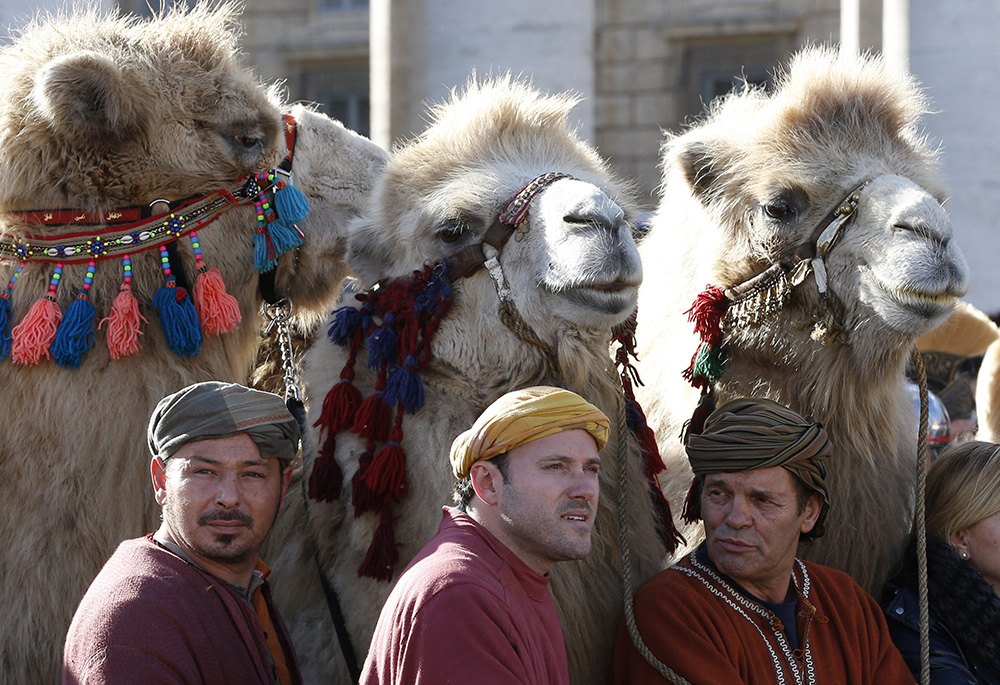
Three camels stand behind men in traditional attire in St. Peter's Square as Pope Francis leads the Angelus on the feast of the Epiphany in 2018 at the Vatican. (CNS/Paul Haring)
"I spent a lifetime looking for you." So begins Johnny Lee's country-western song, "Lookin' for Love." Country music, like folktales and the Gospel infancy narratives, philosophizes with homespun wisdom about the most basic human events and emotions. Might the Magi have enjoyed this song along their desert route?
Imaginative versions of the story of the pilgrims who sought the Christ child are generally fairly romantic and formulaic. Matthew's description of their gifts has solidified the idea that they were three wealthy fellows. Their identity morphed into royalty because people identified them with Isaiah's description of the nations who would seek Israel's wisdom and relationship with God.
Realistically, a desert-crossing caravan "from the east" surely included more than three people — not only servants, but different generations of pilgrims representing one or more clans. Perhaps it's because we know almost nothing about them that they can take hold of our imagination and become the carriers of our own search for meaning.
When we let the Magi camp out in our imagination, they appear as meaningful today as they did centuries ago. First of all, in line with what Pope Francis suggests in "Laudato Si', on Care for Our Common Home," they followed their star, seeing it as a natural gift from God, symbolizing the love that draws creation toward universal communion. The Magi's first discovery was that the leaders of the very people best prepared to have welcomed that love had gotten caught up in the rhythm of preserving petty power. When the pilgrims sought the wisdom of Israel, the religious leaders cited prophecies while remaining tragically incurious about their implications for their own time.
Unlike the lackeys who theologized for Herod, the Magi were genuine religious pilgrims, people willing to cross physical and intellectual borders. Something we would call grace enticed them, leading them to believe that nature itself was communicating a message of earthshaking importance. Surely, the Magi were wealthy and therefore socially significant in their own right. Yet, like Abraham, they were willing to risk name and fame, to seek more than the comfort and power they knew at home. It takes a particular combination of courage and confidence to do what they did. In a very real sense, they were the precursors of the disciples who abandoned their occupations and even their reputations for the sake of the Gospel.
Today's feast day is called the Epiphany of the Lord. The Greek word epiphany is a synonym for apocalypse; both refer to a revelation. Merriam-Webster tells us that a revelation is an enlightening or astonishing disclosure. In the contrast between the Magi and Herod's theologians, today's Gospel depicts the difference between people who can receive a revelation and those who protect themselves from it. Theologian Silvano Fausti describes those open to revelation with the paradoxical statement: "The person who seeks is the person who knows."
Advertisement
What did the Magi know? They knew that their stores of wisdom, knowledge and certainties were smaller than the truth. They knew that growth requires displacement, the uncomfortable process of venturing into an unknown that stretches and questions assumptions, all for the sake of a greater depth of being.
Johnny Lee's song describes the wrong places he'd sought love. Most of us could write our own list of dead-end attempts at finding our heart's desire. Matthew's Magi tell us what Luke's Emmaus travelers learned: Life is a journey — always moving forward. Each step can open us to more. The Magi also warn us about what Dietrich Bonhoeffer called cheap grace: the easy answers and religious facts that provide security rather than call us into growth.
In sum, the Magi had more faith in God than in their own ideas and understanding. They were willing to sing "I spent a lifetime looking for you" for the rest of their lives. We might look to them as the patron saints of evolution, reminders that no matter how much we accomplish, learn or love, God keeps offering more to those who are willing to seek and find it.
The feast of the Epiphany invites us to holy disquiet, a way of living that has nothing to do with grumbling or complaint. We can make holy disquiet a lifelong posture by nurturing it with wonder, gratitude and hope — all of which require humility. Holy disquiet leads us to appreciate the good of every moment not as something to be grasped, but as a promise of more.
Surely, we will sometimes end up in the wrong places, but, like the Magi who could leave Herod to his own devices, it's always possible to reorient ourselves. Our journey will not end on this Earth, but we cannot do better than spend our lifetime seeking.
